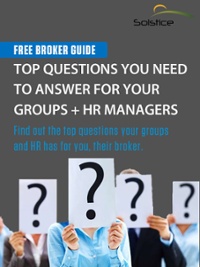By Alissa Gavrilescu on May 17, 2017 11:50:44 AM
Your clients' role has changed. The day-to-day work of benefits administrators and human resources professionals is not what it used to be. As the trusted broker to your clients, have you shifted your role to meet the new needs of human resouces?
Part of your success as an insurance broker is supporting your clients and delivering services to make their job easier. But you also need to keep up with changes. Knowing how their role has changed will help align your service offerings to your client’s needs. The more in-the-know you are as their trusted broker, the more valued you become. Here’s what benefit professionals are citing as the biggest changes to their jobs – and the most challenging aspects of their daily routines:
 HR is wearing more hats than ever
HR is wearing more hats than ever
Several months ago, I spoke with HR Florida President Joyce Chastain about how changes in Health Care is modifying the role of HR. She shared that most human resource practitioners have their regular job to do that includes their routine, everyday workload which probably doesn’t have much to do with benefits. Once a year they have to evaluate their plans and initiate open enrollment. With the changes in health reform, technology changes like Private Exchanges and the need to educate employees more in their benefits to accommodate the consumer-driven shopping trend, HR is spending a lot more time entrenched in benefits. So, you're probably wondering how brokers fit in. Your clients need their brokers to take the lead in navigating them through reform and changes in the ACA that could impact their organization. Private exchanges and single source billing platforms are a great tool to offer your clients to simplify the growing workload of your clients. Offloading administratively-heavy tasks will go a long way in the eyes of your client and create continued value for you, their broker.
Open Enrollment is more complex for your clients
Employee benefits have shifted to a consumer-driven system. In the past, benefits have been something that your clients have handled for their employees. Now, it’s a process employees are going to have to take ownership of with the shift to a defined contribution model. And research shows that without proper educational tools, employees might not be fully equipped to make informed health care choices. For example, if an employee has historically worked for an employer who has provided health care and if they are in a small to medium sized company and that employer is not going to offer health insurance anymore because now it’s available through an ACA marketplace (or private exchange) a majority of these employees are not going to know how to effectively shop…the majority of employees likely will not understand what those charges mean.
What does this mean to your client? What is the role of HR during changes in health care? More questions from their employees coupled with added complexity fielding federal subsidy questions.Research shows that more than 77 million Americans struggle to understand basic health care terms. While these terms are fairly standard benefit features for any broker or benefits administrator, the average employee does not understand how to confidently shop for health care benefits.What can you do to simplify benefits? There are a variety of educational tools you can provide your group with to help demystify benefits and even the ACA. Kaiser Family Foundation has a wealth of information pertaining to health reform. It’s written in a way that is easy to follow and simple to digest. If you’re partnering with a private marketplace, you’re going to want one that offers health literacy tools and employee enrollment support features to keep the questions to benefits admins from piling up.
Human resources professionals state that weeding through health reform is daunting
With changes in the Affordable Care Act (ACA) coming down the line, be sure to update your clients as soon as possible so they can prepare their organization and employees. Not sure what those changes look like? We’ve got your back…check out our guide to avoiding costly ACA penalties.
Benefit administrators are on a technology learning curve
Connecting with employees has evolved from traditional methods like email and face-to-face to communicating socially. Companies are turning to social media, blogging and even texting for communications. In addition to the internal tech culture shock, human resource pros are leaning on technology more and more. Payroll systems to online employee development platforms and more…technology is playing a big part of their day.Insurance brokers need to be equally tech savvy if they want to earn the respect of your clients. If their company is active on social media or your client prefers to text instead of call...be ready to adapt. Don’t forget to have your own online presence, too. Plus, if you’re implementing a new technology system for your groups – like a private exchange or benefits admin site – be sure you’re an expert and able to help your clients get up and running in a snap. Providing your clients with service has been paramount to your success as an insurance broker. As the needs of your clients evolve, be ready to adapt. Aligning your services to solve their problems will maintain your professional edge and create continued group loyalty. And if you’re ever in doubt, just ask your clients what their biggest challenges are at the office and find creative ways to solve those issues.





comments